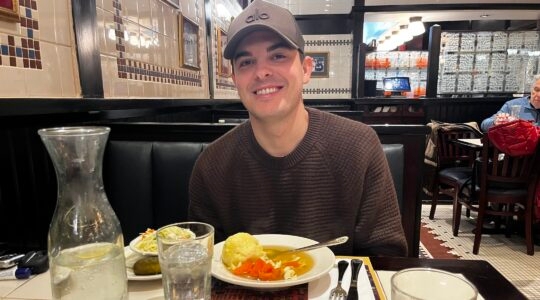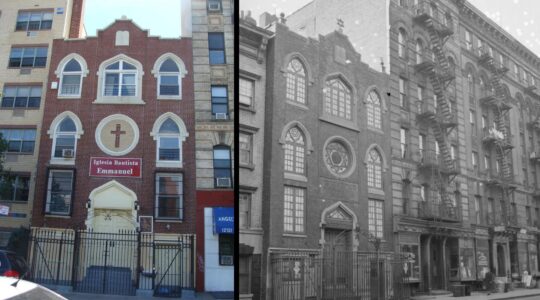Toronto — North of the border, in the cultural capital of Canada, the Toronto International Film Festival has become one of the world’s best showcases of cinema. With a myriad of world premieres, directors and cast members from across the globe in attendance, TIFF has become a go-to place for movie lovers. The list of films screened this year was extensive, with screenings beginning as early at 8:30 in the morning and continuing until after midnight on 33 movie screens spread across downtown Toronto.
This year’s festival featured a plethora of Jewish and Israeli movies: Israel was represented by four feature narrative films and two short subject films. There were four films with distinctly Jewish themes and not surprisingly, three of them are set during World War II.
Here’s a sampling, ranging from an Israeli rock opera, a Yiddish-language horror story, an adaptation of a classic novel by Jerzy Kosinski and a seriocomic story of a German boy and his friend Adolf (yes, that Adolf).
“Synonyms”
Nadav Lapid’s film won the prestigious Golden Bear prize at the Berlin Film Festival. Set in Paris, it is about an Israeli who wants to become totally French and in doing so attempts to erase his origins. Lapid told me that he began work on this largely autobiographical story shortly after completion of his military service during a time when he was struggling with his identity as an Israeli. Imaginative and ground-breaking, the film will be screened again at the New York Film Festival taking place later this month. (More on ‘Synonyms’ here.)
“Incitement”
Just as troubling and compelling is Yaron Zilberman’s film, “Yamim Nora’im,” (literal translation “Days of Awe” but referring to the High Holidays). For it’s worldwide release the title was changed to “Incitement.” It’s a look at the radicalization of Yigal Amir, the law student from a nurturing Yemenite family who assassinated Israeli Prime Minister Yitzhak Rabin. Zilberman focuses not only on the perpetrator but also on his enablers. Yehuda Nahari Halevi portrays Amir, from his early days at Bar Ilan University through his failed relationships and his grappling with the politics of the day. The film highlights how he comes to his radical interpretations of rabbinic text, and his eventual decision to murder Rabin. I was not sure if I could sit through to the film’s inevitable ending, but Zilberman tackles the concluding moments with necessary sensitivity.
“Red Fields”
An Israeli rock opera made its way to the festival this year, conveying a strong message through its edgy and discordant music. Keren Yedaya’s film (“Mami” in Hebrew), is a cinematic adaptation of a musical that had a cult-like following in the 1980s, largely because of its anti-military message. The story follows Mami, a young woman from a development town in the south who wants more from life, but everything changes when her husband returns from reserve duty in a wheelchair. A narrator and orchestra provide operatic structure, and Mami (Neta Elkayam) portrays and empowering lead, fighting for the rights of the marginalized. The eclectic mix of traditional and contemporary music, joined by stunning choreography, makes this work impressive.
“Africa”
Director Oren Gerner succeeded in having me feel like a guest in his parents’ living room, as I watched “Africa,” a film he described to me as a love story about his family. Using a reality-show approach, the filmmaker focuses on retired 68-year-old Meir, who sees himself as irrelevant to neighbors, family and community. Meanwhile, his wife happily goes about her routine of singing in the village choir and conducting her psychotherapy practice.
Notwithstanding Meir’s melancholy, Gerner provides an inspirational portrait of Israeli family-life today. The director’s own parents, Maya and Meir, both non-professional actors, are marvelous as the leads.
“The Vigil”
Among the Jewish-themed films, Keith Thomas’s unnerving horror film, with mostly Yiddish dialogue, is the only one not set during World War II.
Set in Borough Park over the course of a day and evening, the film is about a “shomer” who is assigned to stand guard over the body of a dead woman until it is buried. The shomer is a “yotse,” a former member of the charedi Orthodox world. The night that follows includes a demon, violence and exorcism. One thing to consider: Is the Yiddish horror film a new film genre?
“The Painted Bird”
Czech director Václav Marhoul’s formidable, nearly-three-hour-long black and white film adaptation of Jerzy Kosinski’s 1965 novel is about a Jewish boy who is left to fend for himself in order to survive the final months of the war. The youth wanders from village to village through a maelstrom of depravity. Marhoul spares little in his depiction of evil, leaving this viewer numb. If there is one theme that threads the various chapters of the film, it is that small acts of kindness can make a big difference.
“Jojo Rabbit”
The outstanding film of the festival for me was this unlikely coming-of-age film about a 10-year-old Hitler Youth recruit whose imaginary best friend is Adolf Hitler. New Zealand director, Taika Waitiki (also known as Taika Cohen), whose father is Maori and mother is Jewish, presents an indoctrinated youth who has been fed venomous hate. We observe the young Jojo’s inner struggle when he finds a Jewish young woman who is being hidden in the attic by his mother. I did not expect to laugh, but chuckle I did. I did not expect to tear up, but cry I did. Waitiki not only does an incredible job as director and co-writer, he takes on the role of Hitler, a portrayal worthy of an award. Roman Griffin Davis as Jojo and Scarlett Johansson as his mother are both awesome. This is a story not only about the 1940s, but about our shaken world today.
“Lyrebird”
In first-time director Dan Friedkin’s film, a Canadian Jewish soldier and former member of the Dutch resistance is looking for stolen art in the days following the liberation of Holland. While the Dutch are feverishly hunting down collaborators and seeking revenge, Joseph Piller, played masterfully by Claes Bang, finds himself doubting that a particular artist had aided the Nazis. The Dutch authorities are not amused by this Jew’s involvement. I really liked this film about one man’s commitment to seeking truth and justice in the midst of chaos.
Eric Goldman is adjunct professor of cinema at Yeshiva University and host of “Jewish Cinematheque,” seen and streamed on JBS-TV.
The New York Jewish Week brings you the stories behind the headlines, keeping you connected to Jewish life in New York. Help sustain the reporting you trust by donating today.




